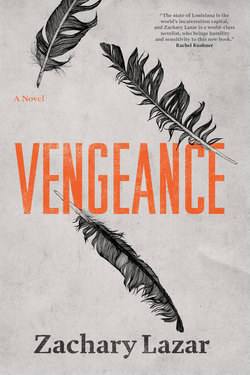Читать книгу Vengeance - Zachary Lazar - Страница 11
На сайте Литреса книга снята с продажи.
Оглавление3
When I got out of bed, my wife, Sarah, was sleeping. I could see even in the darkness the pair of barrettes, covered in gold glitter and shaped like butterflies, that she kept fixed to the shade of her bedside lamp. She was an obstetrician and gynecologist, and sometimes I dreamed about having to do her job, standing in the delivery room with mask and gloves on and no idea of how to proceed. Every time I saw those barrettes on her lamp, I remembered a trip we’d made to Costa Rica where we’d seen enormous butterflies six inches wide, their wings an implausibly brilliant blue. At one point during that trip, we’d taken a six-hour horseback ride over mountains and across rivers. There was a steep rocky gorge that the horses plunged down at full speed, and I remember looking back, seeing my wife assume an instinctive pose of balance, one hand holding the reins while the other extended high in the air behind her head, whooping with fear and laughter but also achieving perfect rodeo form. I had the kind of temperament that sometimes caused me to wake up in the middle of the night like this, my mind turned away from such pleasant memories. I went into the room now where I worked and took out one of the banker’s boxes stuffed full of documents I’d amassed while researching my book about my father’s murder. I hadn’t opened it in at least four years, and I was surprised by the dense profusion of its contents—folders full of newspaper clippings, FBI transcripts, photographs, rubber-banded stacks of notecards. There were the photocopied articles about the land business my father had been a part of for several years, the hundreds if not thousands of pages I’d read and reread. In 1975, my father was murdered when he had to testify against his former business partner in a probe that exposed an extensive pattern of bribery and fraud. More than thirty years later, I’d tried to understand why this had happened and why no one had ever been charged with, much less convicted of, my father’s killing. Grand Jury Witness, read the first headline in the pile, Is Slain Gang Style. I found the clipping but saw that the photograph of my father’s dead body had been whited out, which was strange, because I knew I’d seen it somewhere. I could remember the way the picture had been bleached by the microfiche machine, softened into an image of a man younger than I was, lying in a parking garage stairwell, his eyes closed, dressed in a suit, as if he’d fallen asleep there for some reason on his way to a wedding. It was four o’clock in the morning. I couldn’t stop looking for the picture, knowing it was somewhere in the folder. “You’re pressing the button,” my friend Simeon would say later, referring to this kind of compulsion. George Orwell, writing about why he wrote, said that “one would never undertake such a thing if one were not driven on by some demon one can neither resist nor understand.” I finally found the photograph toward the back of the stack.
It was late, a different weeknight, but the bar was close to home, nearly empty, and we liked to go there for the music. The singer had a voice that might have made him famous fifty years ago. He was a little paunchy now, graying, flourishing a white handkerchief he sometimes used to dab his forehead, singing a song about surviving, enduring. The drummer stayed just behind the beat so that the slow song had kick, the guitar player melting little country-and-western riffs into soul. It sounded like it was 1970 and instead of seven of us in the bar who knew some of the words it was a theater and there were many more of us. The world outside was on fire, it always was, and though the singer didn’t sing about any of that he alluded to it in the timbre of his voice. He sang about coming home to New Orleans—parochial, poor, beautiful, inescapable—and the part of the song that was celebratory was not false and the part that was sad was not weak. Sarah always liked the way his belly moved when he danced. I liked the sound of his band in this bar, linoleum on the floor, the low stage, the bulky metal chairs painted black, the song about a moment like this—the smoke, the liquor, the colored lights, time stolen from work and worry, not just surviving but something more than that, something that made you smile and cry at the same time.
